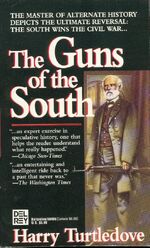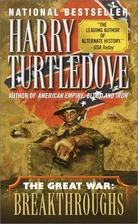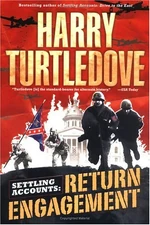| ||||||||||||||||||||||||||||||
George Brinton McClellan (December 3, 1826 - October 29, 1885) was a United States Army officer in the 19th century. He served with distinction in the Mexican-American War and in various antebellum peacetime assignments, including one as a military observer of the Crimean War.
During the American Civil War, McClellan was promoted to Commanding General of the United States Army upon the retirement of Winfield Scott, a retirement which Scott had not tendered altogether willingly but which was pushed onto him in part by McClellan's political machinations. Over the winter of 1861-62, McClellan organized and trained the massive numbers of US Volunteers into an effective fighting force; however, when the spring campaign began, and McClellan took to the field in command of the Army of the Potomac, the Union's largest field army, he proved notoriously slow and reluctant to campaign. After repeated exhortations to begin military operations by President Abraham Lincoln, McClellan finally launched an amphibious landing on the Virginia Peninsula with the goal of advancing up the Peninsula to take Richmond. McClellan was timid on this campaign, frequently citing wild and incredible intelligence reports which claimed that the badly outnumbered Confederates were fielding as many as ten times their true numbers. McClellan finally allowed himself to be repulsed from the Peninsula and driven back to Washington, DC where he once again refused to take to the field. He was temporarily sacked but soon reinstated. Finally he was forced into a listless overland campaign when several corps of the Army of the Potomac were detached and assigned to the Army of Virginia under the command of McClellan's rival, John Pope. McClellan halfheartedly supported Pope as the latter endured a decisive defeat at the hands of Robert E. Lee at the Second Battle of Bull Run in August 1862.
In the autumn of 1862 the Confederates invaded the loyal state of Maryland. McClellan benefited from the extraordinarily good luck of finding Special Orders 191, his enemy's marching orders, which told him that his enemy was not advancing as a whole force but was scattered across the countryside division by division, and the exact locations of each division were provided. Inexplicably, McClellan did not destroy the enemy in detail but allowed them to consolidate before offering battle at Sharpsburg, Maryland. After a day of extremely heavy fighting left the Union army with a clear advantage, McClellan refused to press the advantage despite strident encouragement to do so from his subordinates, incorrectly claiming that his reserves were exhausted, though in fact he had two entire corps held in reserve and a number of smaller units which equaled the size of a third corps. McClellan allowed the enemy to escape to rebel territory, claiming a decisive victory because he was in possession of the field. Indeed he continued to remain in possession of the field for weeks afterward, until it seemed the army would have to make winter quarters in Sharpsburg. After disobeying Lincoln's direct order to advance, McClellan was sacked for the second and final time.
Though he had commanded the United States' largest field army in its history up to this point, and enjoyed significant advantages over his enemy in materiel and supplies, he was among the most ineffective generals of all time. After being drummed out of the military, McClellan turned to politics and ran against Lincoln as the Democratic Party's presidential nominee in 1864. McClellan ran on the platform that the Union could not honorably defeat the rebels, when in fact, thanks to McClellan's having been sacked, a better caliber of US commanders such as Ulysses S. Grant, William Sherman, and George Meade had by now finally reversed the disadvantages at which McClellan had left them. Lincoln defeated McClellan in a landslide and he only carried 21 electoral votes from the three states of Delaware, Kentucky, and New Jersey.
Later in life McClellan served as Governor of New Jersey (1878-1881) and as a railroad executive. He one of several very prominent Americans swindled out of large amounts of money by a dishonest diamond investor.
George McClellan in The Guns of the South[]
| The Guns of the South POD: January 17, 1864 | |
| Type of Appearance: | Contemporary references |
| Political Party: | Independent coalition (1864) |
| Military Branch: | Army of the Potomac (Second American Revolution) |
George McClellan commanded in the Army of the Potomac in 1861-2 during the Second American Revolution. His cautious nature worked against his own advantage, as he missed several opportunities to win a strategic victory during this time period. A few years later, Confederate politician Judah Benjamin compared this habit of McClellan to the Roman General Quintus Fabius Maximus, who was known for his strategic delays that weakened his enemies. The difference was that McClellan's delays only weakened his own army.[1]
McClellan had already been relieved of command when the America Will Break provided the Confederate Army with AK-47s. Nonetheless, he still was one of several Union generals who were used as imaginary targets when the AWB men demonstrated the new repeater to Robert E. Lee and his staff.[2]
McClellan was remembered with disdain by General Lee during the Battle of Bealeton.[3] McClellan's house in Washington City was captured by the Army of Northern Virginia in 1864.[4]
McClellan sought the Democratic Party nomination in the 1864 presidential election.[5] When he lost the nomination to Horatio Seymour, he ran as an independent on a platform calling for the invasion of the Canadas.[6] Edward Everett was his running mate. Seymour won the close election while incumbent Abraham Lincoln came in second. McClellan came in third in the electoral college but last in the popular votes. He carried only the states of New Jersey (his home state) and Delaware.[7]
George McClellan in Southern Victory[]
| Southern Victory POD: September 10, 1862 | |
| Appearance(s): | How Few Remain |
| Type of Appearance: | Direct |
| Date of Death: | Unrevealed |
| Military Branch: | Army of the Potomac (War of Secession) |
George McClellan was commander of the Union Army of the Potomac in 1862. Before the War of Secession began he had had some success as a military officer and a railroad executive. He was also able to take credit for the success of an early campaign in western Virginia, in which forces under his command defeated those of Robert E. Lee. However, the real hero of that campaign was William Rosecrans.
In October 1862,[8] McClellan was charged with defending Maryland and Pennsylvania against an invasion by Robert E. Lee. Due partly to the failure of Union intelligence to find the major columns of Lee's army and partly to McClellan's incompetence as a field commander, Lee was able to steal a march on McClellan and threaten Philadelphia. In desperation, McClellan was forced to offer battle at Camp Hill, Pennsylvania, a less than ideal position to defend (as McClellan had been warned by Ambrose Burnside).[9] Caught on the shores of the Susquehanna River and hit with all the force the Army of Northern Virginia could muster, the Army of the Potomac was destroyed, and Lee took Philadelphia unchallenged,[10] forcing President Abraham Lincoln to accept Britain's offer to mediate a peace agreement including recognition of the Confederate States.[11]
McClellan commanded the largest army in the history of the world to that point, and should have easily defeated the badly outnumbered Confederates. However, though Abraham Lincoln was made to bear most of the blame for the Union's defeat, it was the serious shortcomings of McClellan's military leadership which snatched defeat from the jaws of victory. In ensuing generations of US soldiers, McClellan came to be considered among the worst generals in the nation's history. In fact, the most common criticism of Lincoln is that he did not sack McClellan and replace him with a more competent general.[12]
George McClellan in "Lee at the Alamo"[]
| "Lee at the Alamo" POD: December 13, 1860 | |
| Type of Appearance: | Contemporary reference |
As the war began to heat up in the summer of 1861, George McClellan commanded forces in Virginia's western counties, which were subject to invasion by Confederate forces who refused to accept the division of Virginia by the state's legally-recognized Unionist government. In one battle, McClellan's forces captured two Rebel officers who held the rank of colonel. The U.S. War Department exchanged one of these POWs for Robert E. Lee, allowing Lee to return to active duty, if he wanted to.
Colonel Lee knew of McClellan since they had both fought in the Mexican-American War, and recalled how McClellan had left the Army afterwards, went into railroading and done quite well for himself. He was impressed to learn that McClellan was back in uniform and accomplishing so much already.
See also[]
- Brinton the Bold: An analog of McClellan in The War Between the Provinces.
- Horatio Seymour, the Democratic Party nominee for President of the United States in 1864 in The Guns of the South.
References[]
- ↑ The Guns of the South, pgs. 264-265.
- ↑ Ibid., pgs. 6-7, MPB.
- ↑ Ibid., pg. 143.
- ↑ Ibid, pg. 181.
- ↑ Ibid., pg. 249
- ↑ Ibid., pg 264.
- ↑ Ibid., pg. 281
- ↑ How Few Remain, pg. 4.
- ↑ Ibid., pg. 5.
- ↑ Ibid., pgs. 6-7.
- ↑ American Front, pgs. 1-8.
- ↑ The Grapple, pg. 544.
| Party political offices (OTL) | ||
|---|---|---|
| Preceded by Stephen Douglas |
Democratic Party Presidential Candidate 1864 (lost) |
Succeeded by Horatio Seymour |
| Political offices (OTL) | ||
| Preceded by Joseph Bedle |
Governor of New Jersey 1878-1881 |
Succeeded by George C. Ludlow |
| Military offices (OTL) | ||
| Preceded by Winfield Scott |
Commanding General of the United States Army 1861–1862 |
Succeeded by Henry Halleck |
| Preceded by Newly created office |
Commander of the Army of the Potomac 1861-1862 |
Succeeded by Ambrose Burnside |
| ||||||||
| ||||||||||||||
| |||||||||||||||||||
| ||||||||||||||
| ||||||||||













